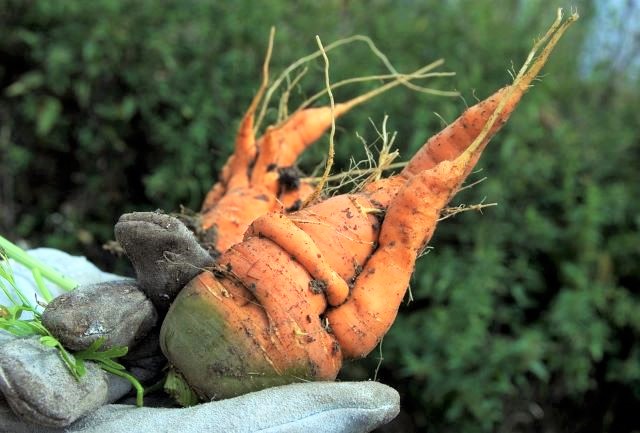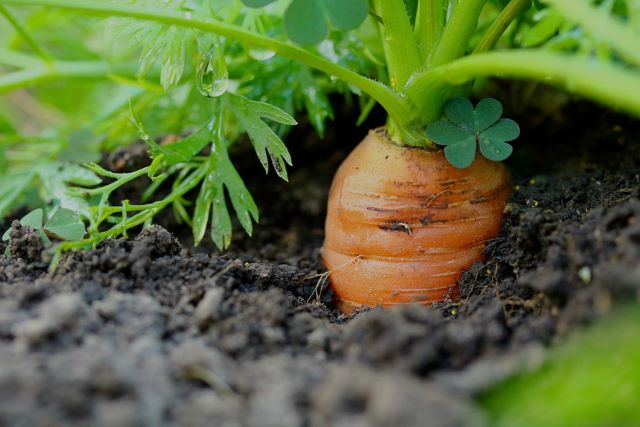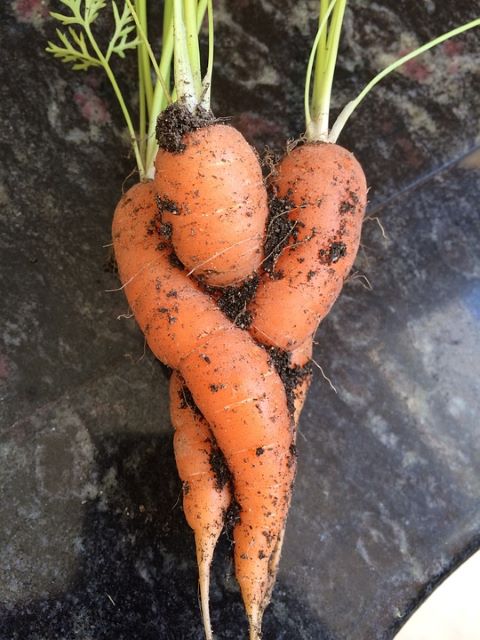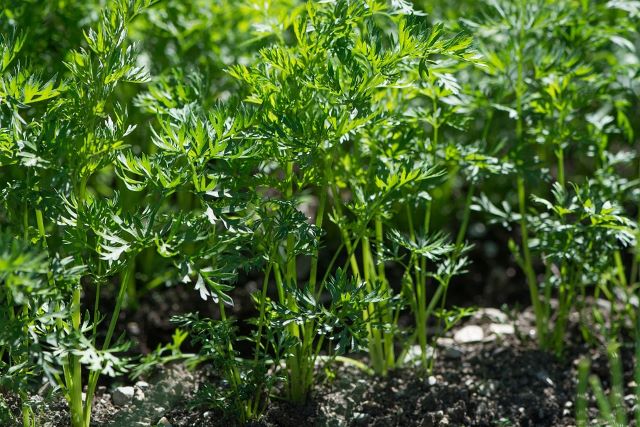Have you ever wondered how store-bought carrots are always so straight? Whereas all the carrots I’ve grown in my vegetable garden seem to come out of the ground looking twisted, forked, bumpy, disfigured, or deformed. If you’re experiencing the same problems with your home-grown carrots, like me, you will want to find out the “root” of the problem.

Why Are My Carrots Deformed?
The most common causes of deformed carrots are compacted soil, rocks and gravel, incorrect watering, transplanting, overcrowding, high levels of nitrogen, weeds, and pests.
Let’s find out more details about the causes of deformed carrots and solutions to growing straight carrots (Daucus carota) in the future.
1. Compacted Soil
The type of soil carrots are planted in will impact their shape and size. As a carrot plant’s taproot grows in the soil, it will follow the easiest growth path available. Compacted soil hinders the growth path of the root and is one of the main causes for carrots to become deformed in shape.
Dense, compacted soil, or soil that has a high percentage of clay, forces the edible roots to bend or split. Carrots that are planted in soil that is nutrient deficient also tend to grow skew, or will be small in size.
Using the correct type of soil for growing your carrots is very important. Carrots are best grown in soil that is loose, deep, and high in organic material.
If you have compacted soil, you can add a mixture of compost and coarse sand to the soil. This will help lighten the soil while adding essential nutrients.
If you find that your garden soil is just too compact and not suitable for growing carrots, you can always plant them in a raised garden bed, with a combination of your garden soil and the mixture mentioned previously.
To further prevent your carrots from developing deformities ensure the soil is deep enough (10-12 inches) for the carrots to freely grow down into the soil.

2. Rocks and Gravel
Although rocks and gravel form part of the soil, both large and small rocks can act as obstacles in the soil which will cause defects in the growth of your carrots. When a carrot plant’s roots meet a rock or pieces of gravel, they’ll be forced to grow upwards or branch out.
Any rocks or gravel should be removed from your growing bed in preparation for planting carrots. Large rocks can be removed by hand whilst smaller rocks or gravel can be removed with a rake if they’re at the surface of the soil.
Another effective soil preparation tool that I like using is a garden fork.This tool can be used to comb through the soil, loosening it up and aerating it, as well as assisting in the removal of both large and small stones.
3. Incorrect Watering
Carrots may split and/or crack, resulting in unsightly carrots. These blemishes can be due to inconsistent moisture levels in the soil throughout the carrot’s growth period. If your soil is too dry, it will cause the roots of your carrots to split and soil that is too wet will also result in cracked or split roots.
Maintaining good moisture levels in your soil (if your soil is too dry) can be achieved by frequently watering your carrots. You should water your carrots with at least 1 inch of water every week.
I know it can be difficult to maintain consistent moisture levels in your soil, which is why I check the levels of moisture in my soil with a moisture meter.
Alternatively, you can grab a handful of soil just below the surface layer of your garden and give it a firm squeeze. If the soil sticks together or maintains its shape, it has some moisture in it, whereas if it crumbles, the soil is too dry and needs to be watered.
4. Transplanting
The roots of a carrot are incredibly sensitive and shouldn’t be transplanted from one body of soil to another. Transplanting carrot seedlings can cause their roots to branch and become forked, resulting in deformed carrot shapes.
So avoid transplanting carrots if you can. Instead, it’s a good idea to directly sow your carrot seeds in the garden you intended to grow them. This will avoid the possibility of damaging the roots of your carrots, and prevent them from branching.
5. Overcrowding
Carrots need their own space to grow and don’t do well sharing a bed (I’m sure most of us can relate!). These root vegetables need sufficient space to extend their roots, so if carrots are planted too close together, it will force them to grow in strange directions in order to avoid their neighbor’s roots. Or sometimes they’ll grow twisted together like the image below.

When carrot seeds are sown, there are often multiple seeds that will begin to germinate in close proximity to each other. As the carrots begin to grow, they’ll begin to overcrowd your garden and compete for the nutrients in the soil which will also lead to deformities in your carrots.
An effective way to manage overcrowding in your home garden is by thinning out your carrot plants. Carrot seedlings can be removed by hand by simply pulling them out of the ground. It’s best to remove the excess germinated seedlings as soon as possible in order to avoid their roots from becoming entangled.
I’ve found spacing carrots 2-3 inches apart from each other avoids overcrowding.

6. High Levels of Nitrogen
Nitrogen is beneficial for the development of any plant, however, this is not the case when it comes to carrots. Carrots are adversely affected by high levels of nitrogen in the soil which can cause them to branch or develop hairy roots.
Potassium and phosphorus promote the development of roots, and as carrots are root vegetables, these two nutrients will help your carrots to grow long and straight. If you are planning on adding compost or manure to your garden, I suggest using aged manure as it has a lower nitrogen content.
Prior to planting your carrot seeds, it’s important to test the nutrient levels in your soil. Use a test kit to measure the levels of nitrogen, potassium and phosphorus in the soil. If the test results come back with low levels of phosphorus and potassium, add quantities of bone meal to your soil.
I like adding an an all-purpose organic fertilizer like this one to the soil, or any organic fertilizer with a low nitrogen concentration, as it will assist with the development of your carrots.
7. Weeds
When planting vegetables, it’s seldom that you won’t encounter a problem with weeds sprouting between them in your garden. If weeds are left to take over your garden, they will cause multiple problems, including stunting and retarding the growth of your carrots.
Weeds will compete with your carrots for moisture and nutrients in the soil, as well as growing space. The increased competition and lack of space can only mean one thing – skinny, deformed carrots!
Prevention is always better than cure, which is why should mulch around your carrots. Weeds require air and moisture to grow, so spreading a layer of mulch around your carrot plants will “suffocate” any potential weeds before they pop up.
Covering the soil surrounding your carrot plants with a weed barrier is also an effective method. If any weeds sprout in my garden, I always try to remove them with their roots, else they tend to grow back even faster!
8. Pests
Just like any other vegetable, your carrots pose as a tasty snack for hungry pests. These pests often live underground and will start to eat your growing carrots without you even being aware of them. This can result in major deformities and often leads to diseases infecting your carrots too.
Common carrot-eating pests that reside in the ground include cutworms and carrot rust fly larvae. Sprinkling diatomaceous earth around the base of your plants will kill any crawling or squirming insects as it is a safe, natural means of pest control.
Another organic method that I find extremely effective in controlling pests is the addition of beneficial nematodes which you can purchase, to the soil. This is especially important if your carrots are deformed by root-knot nematodes which are minuscule parasitic roundworms in the soil. Beneficial nematodes can also be encouraged to the garden with healthy compost and aged manures.
For pests that live on the foliage of my carrot plants, I use a natural neem oil spray.
Finally, Wonky Carrots are Still Edible
Unless your carrots are diseased, any deformed or misshapen carrot you grow is still very much edible. So while it might like strange, rest assured your funny looking carrot can still be eaten and will still taste delicious!
Further reading:
